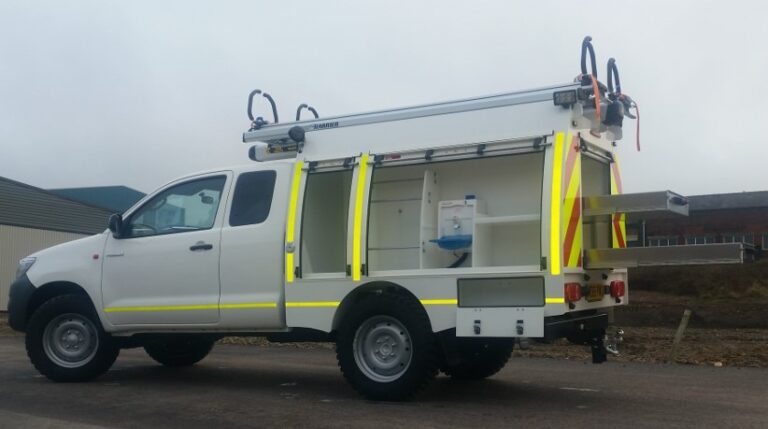– By Caroline Falls –
PT Rescue, a Mount Waverley-based business has introduced lightweight, incredibly strong plastic service bodies, or ute backs. to Australia. The polypropylene plastic bodies are suitable for utes and vans and ideal for firefighting vehicles that need to cut weight anywhere they can to carry more emergency and essential equipment — water, ladders, jaws of life, hoses etcetera.
“We have just delivered out first units to an SES customer and have just received more orders from a council authority,” said Stuart Coulton manager of fire products at PT Rescue. He said he has been promoting the plastic bodies for about three months and achieved 12 sales to date, mainly into the fire and rescue market. “We are now starting to talk with power companies and fleet service vehicle operators.”
Coulton, originally from Britain, said PT Rescue is presently importing the bodies fully assembled from Europe, where they are widely used. The plastic bodies found a particular niche in the fire and rescue market in Europe as first responders to emergencies, namely because they are smaller and more nimble in heavy metropolitan traffic situations.
“The Australian market is huge; one of the biggest in the world,” said Coulton, adding, “Some brigades have 3,000 vehicles alone. Ute sales into Australia are also huge and potentially every one of them is a possible customer.”
PT Rescue is a division of Melbourne-based PT Hydraulics Australia which has supplied products, finance, and services to the rescue, fire and emergency services industries in Australia and New Zealand for some 35 years.
PT Rescue exhibited at the Australasian Fire & Emergency Service Authorities Council (AFAC) three-day Fire & Emergency Management Conference in Brisbane, ending Sept 1.
“It’s been very, very well received,” said Coulton, adding, “People walking past didn’t realise it was polypropylene; they thought it was fancy steelwork.”
The polypropylene bodies have curved edges. They are double spray painted, edge primed and seams are welded, giving them strength.
“You can hit them with a sledge hammer and can’t break them.” The polypropylene absorbs impacts and springs back into its original shape. The polypropylene used is about 12 millimetres thick for the walls and 15 millimetres for the frame, compared with about 1 millimetre thickness used in a wing mirror, said Coulton.
Coulton said PT Rescue is offering warranties on the bodies for 10-12 years, including after it has been remounted onto a new vehicle.
“Your fleet guys can get three or four swaps out of a body if they are changing over vehicles every three or so years,” said Coulton.
Coulton detailed some of the other key properties as: 20 percent lighter than a standard aluminium or steel build, with the weight savings translating into a 20 percent increase in payload. They have a 167 degrees Celcius melting point and retain their properties at freezing point. The plastic bodies 100 percent recyclable at the end of life.
For the fleet world these bodies will give you weight savings, fuel economy and longevity. If you reverse into a gate post 90 percent of the time you won’t get any damage, said Coulton.
The bodies are bespoke designed. Coulton said theoretically a body can take three months from order to placement.
He said presently the initial outlay is more expensive than a traditional aluminium body but that it would drop once orders are sufficiently strong to warrant local assembly. Coulton said whole-of-life costs are significantly reduced when taking into account the 10-year warranty.
“Once we get to 40 plus trucks a year we would be looking to import flat packs and weld the bodies together locally,” said Coulton.






